ECOLOGIA’s China Earthquake Relief
Loans for Village Rebuilding
Progress Report, January 2009

Region: Sichuan Province, China
Collected: $52,338
Goal:
Working through existing contacts in Sichuan Province, ECOLOGIA organized and implemented a sustainable re-building loan program in response to the May 2008 earthquake. Our quick action just after the earthquake, and continued support for survivors struggling to rebuild, became a model for the entire region.
On May 12, 2008, the 7.9 magnitude Wenchuan earthquake devastated a vast area in northern-central Sichuan Province, China. ECOLOGIA’s China Programs office in Chengdu, the capital of Sichuan Province, became the epicenter of our Earthquake Relief program in response to the emergency. Thanks to the donors who came forth to help us, we are now well on the way to achieving the short and medium-term goals of our project: to provide prompt and appropriate assistance for rebuilding in a more earthquake-resistant and environmentally sound manner; and to lay the groundwork for long-term rural economic and environmental sustainability through encouraging community involvement.
Three decisions turned out to be crucial for the success of this effort:
- The decision to implement a loan program, rather than providing outright gifts of aid;
- The commitment to expanding and deepening our working relationship with the Rabbit King Poverty Alleviation Research Center;
- The decision to concentrate our efforts in Qili Village (100 + households, 44 kilometers / 27 miles from the epicenter) and to work intensively with the people and social structure there.
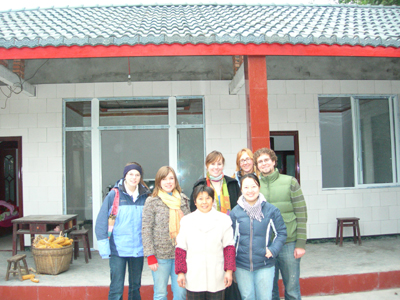
Much of this report will focus on the community, and on how we have worked to keep alert to the implications of people’s actions for the big picture of sustainable development. But often what most inspires and motivates us in our day-to-day work is the individual responses and personal connections. The photo above shows Peng Yu Hua, whose five-person household includes herself and her husband, their son and daughter-in law, and granddaughter. Her family’s house was devastated by the earthquake, and when ECOLOGIA staff first met with her after the earthquake, she was very depressed. Her husband returned from factory work away, to work on the construction of the new home. She is smiling now, standing in front of her home and surrounded by ECOLOGIA staff and volunteers: from left to right: Miko Heller, Meg Young, Peng Yu Hua, Kate Leyland, Du Heng, Stephanie Ellis, and Dan Knowlton.
THE LOANS AND THEIR RESULTS
1. Repair and rebuilding loans made in Qili Village, May – December 2008
2 complete rebuilding loans (25,000 RMB or $3,675) = $7350 (5-year repayment term)
23 repair loans @ 1000 RMB or $150) = $3,450
42 family support loans @ 1190 RMB, or $175) = $7,350
1 major reconstruction loan (10,000 RMB or $1470) = $1470
1 grain mill loan(2000 RMB or $300) = $300
1 herbal medicine store loan (2000 RMB or $300) = $300
Loans total: $20,220
2. Loan management: Zhang Shuping (the “Rabbit Queen”) and Xiao Zhen of the Rabbit King Poverty Alleviation Research Center (RKPARC) are managing the detailed financial tracking and record-keeping for each loan. They participate in the monthly Qili Village meetings along with ECOLOGIA staff. Because they are local Sichuan rural people, speaking the Sichuan dialect, they are a direct link between the world of Qili Village and the “outside”. They also are alert to the many facets of poverty and deprivation, and thus also to subtle and significant changes.
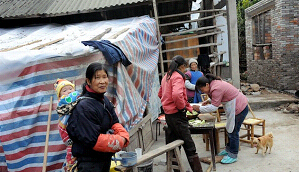 An anecdote from the Rabbit Queen about the impact of our work:
One woman learned how to write her name just to be able to sign for her loan from ECOLOGIA. She had never gone to school, and believed her fate was to raise her son and nothing else. Learning to write her name was a point of pride and a major accomplishment for her.
An anecdote from the Rabbit Queen about the impact of our work:
One woman learned how to write her name just to be able to sign for her loan from ECOLOGIA. She had never gone to school, and believed her fate was to raise her son and nothing else. Learning to write her name was a point of pride and a major accomplishment for her.
3. The decision to implement a loan and repayment structure (not outright gifts of money or materials)
This approach encourages responsibility
Since people need to realistically be able to plan to pay the loans back - and Chinese people traditionally are very hesitant to take on any debt - this helps to keep the loans on an appropriate scale for recipients’ resources and anticipated income. Most of the rebuilding loans are approximately $150 USD; recipients have a year to repay them.
Each loan recipient needs to have a “borrower group” of three others, who publicly attest to his or her serious intent to use the money wisely, and share the responsibility for repaying the loan on time.
This approach builds community.
The loans are to be repaid not to ECOLOGIA, but to the Qili Village community fund. This will provide a pool of money, starting next year, designated for community improvement projects.
We are trying to encourage a sense of real ownership about community that is viewed as an opportunity and something positive, not as forced collectivization. We are working to shift the thinking of Qili villagers from "when do I get my money" to "how are we raising the tide for all together". The community fund is to be jointly administered by the representatives from the village, RKPARC, and ECOLOGIA.
This approach gives residents the power to make their own decisions (since it’s their money) and thus requires us to work with them rather than dictate to them. While seemingly less “efficient” in the short run, it means more ownership by and empowerment of the residents, which in the long run is a significant component of sustainability.
We engaged in extensive discussion with the villagers, of the merits of the new, more ecologically friendly and earthquake-resistant materials and building methods. Some have gained widespread acceptance; some others have not.
The household repair loans (1000 RMB, or $150) are having 200 RMB ($30) forgiven if they make ecological improvements that we can verify. Du Heng of ECOLOGIA researched ways to improve sanitation and reduce water pollution, and identified the “Green Toilet” (a composting toilet which can be put inside a home or public facility). Eight households, including the one which hosts the community meetings, have already installed them. The villagers feel that they are really benefiting from these Green Toilets, which greatly help to improve their home hygiene and sanitation, thus improving their standard of living. Representatives of the China Environment Protection Fund (CEPF), which is promoting the use of these toilets for water-saving as well as for hygiene, are so pleased with the acceptance rate in Qili Village that they are offering the Green Toilets at a subsidized rate to every household (100 in all). CEPF recently recognized Qili Village as a model for regional and national programs promoting rural household sanitation and reduction of indoor air pollution.
The traditional cooking methods - unvented coal or wood burning indoor stoves - create particulate pollution as well as dangerous fumes. Installing a “biogas” system for cooking leads to cleaner and healthier household air. These systems are available for purchase and installation; we forgive part of the loan for recipients who install biogas.
Zhang Shuping organized a trip for a group of the farmers to visit a new model of earthquake-resistant home being demonstrated a few hours drive away, developed by an architectural firm from Taiwan. It had seemed like a great design to ECOLOGIA staff. But when the farmers found the style too foreign and not comfortable for them, they signaled us that they would not choose to live in this style of house. We dropped this plan!
We identified accessible ways, using locally produced materials, that people could make their homes more earthquake resistant. We have made repeated visits and have had repeated discussions as the repairs are underway. The new and rebuilt structures are significantly safer than the ones that collapsed. For example, formerly many people had just laid bricks up with sand (no mortar), built doors without lintels (structural weakness, tends to collapse), or used heavy and unstable roofing materials. Most of the loan recipients have gotten the message that they should invest in better quality materials (roof tiles) and construction methods (timber beams) for safety and economy in the long run. A highly experienced and credible building engineer (Elizabeth Hausler of Build Change) inspected the new homes in October, and provided additional guidance.
To ensure that families would be in their new homes before the cold winter arrives, the Chinese national government announced that its assistance for earthquake rebuilding would only be provided upon proof of spending on demolition and reconstruction done before December 31, 2008. This led to a rush by families panicked at the thought of missing out on the government assistance. With demand exacerbated by this deadline, prices for building materials, and for contractors, went up sharply (for example, the price of bricks went up 500% between June and October). We increased the average amount of the second round of rebuilding loans, in response. We also developed the “loan forgiveness” elements for health and safety improvements, described above, to ease the financial pressures and to provide more encouragement to villagers to invest in these improvements.
The highly publicized and tragic collapses of many public school buildings in Sichuan Province sparked outrage and much press coverage. Poor construction materials and methods were to blame, and along with this came questions of who was responsible? This became a politically sensitive issue. To protect our partners and also our own position as a foreign-supported NGO, we focused on Qili Village, which while 80% of the homes were damaged or destroyed, only had one death and is not in the politically sensitive zone.
LOOKING AHEAD
ECOLOGIA considers assessment to be an important part of every project – especially such an ambitious and intense project as our Earthquake Relief program. There is a lack of established assessment methods for micro-lending, for disaster relief, and also for community well-being. Quantitative surveys of material possessions do not tell the whole story, nor do percentages of loans repaid, though clearly these can be useful. ECOLOGIA has worked with the Rabbit King Poverty Alleviation Research Center to establish preliminary assessment criteria, and to create survey questions. The photo below shows the Participatory Survey Assessment of Qili Village – Map and household information of Qili Village, drawn and discussed by residents with the RKPARC staff. This photo was taken in the “community room”, set up in the house of a young rabbit farmer, Wang Yu, as his contribution to the village.
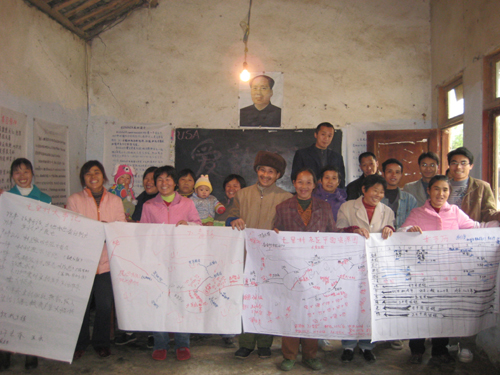
We hope to incorporate more “public space” improvements, such as the public grain mill and herbal doctor’s office, in the coming year. If these decisions are made by the community loan fund, it will demonstrate how the entire community can benefit when individual families pay back their loans.
The volunteer work of an American doctor (Dr. Robbie Ali) this summer identified several low-cost, high-impact public health opportunities. One we have already been able to implement - improving public sanitation through composting dry toilets. He also suggested included promoting low-sodium salt (in response to widespread high blood pressure partially related to high-sodium diets).
We are still working to come up with indicators of contribution to community spirit and well-being. We started with simple measures of attendance at monthly meetings. The RKPARC staff are doing a survey every six months, including questions about organic farming / pesticide reduction, children in school, and family income levels, family structure (are more young adults staying in the village?), and perceived satisfaction. We are tracking the variety of topics raised by the villagers themselves, as suggestions for future efforts.
Financial support for RKPARC and ECOLOGIA staff who manage this project, travel to the village, attend the meetings, research and report on health, safety and ecological matters, remains a challenge for 2009. We were informed in September that Rockefeller Brothers Fund, due to the American financial crisis, will not be able to support our general operating fund grant request for the coming year. We are aware that once the urgency of an emergency situation is over, it is much more difficult to attract attention and donations. Our “Earthquake Rebuilding” project is different, since it is aiming at a long-term solution to entrenched problems of rural poverty, through the rebuilding advice, environmental and health and safety improvements, and promotion of community well-being.
CONCLUSION
We have committed to this project for the long-term, as our goal is to show others in China that a place like Qili Village - and there are many many Qili Villages in China – can become socially rewarding, environmentally healthy and friendly, and economically sustainable. Ideally, a revitalization of the rural regions could absorb some of the displaced “reverse migrants” who have lost their manufacturing jobs in the industrialized coastal cities and are looking for another opportunity for improvement. As factories are closing and the middle-aged villagers are coming home, there could be a crisis in the rural countryside if they return to dashed expectations and despair. Or it could become an opportunity if they come home to new models of wealth creation and new ways to enhance the quality of life in rural villages.
In conclusion, we are committed to the long term development of this village as a model; we are investigating ways to build the economic and community base for long term enhancement, not just earthquake reconstruction. We are still learning about and creating a new kind of micro-finance, focused on collective reconstruction and development, possibly shifting toward some community based enterprises and not relying only on individual and household initiatives.
In a discussion with ECOLOGIA and RKPARC staff in Qili Village almost a year ago (when we were evaluating them for the entrepreneurial micro-finance project of rabbit raising), villagers opened up about where they ultimately wanted to go with economic and social development. They indicated that they wanted to re-unite their families and bring home those who had to go off and work in distant factories. Like many of us in wealthier countries who are coming to terms with severe economic contraction, the people of Qili Village are now seeking to reconcile their economic aspirations with realities. We are convinced that we can learn together, to find more in the context of less, and to find satisfaction and enjoyment with a sense of "enough". These difficult times may force all of us to come to terms with limits and sustainability in ways that we had been avoiding. And we may be able to learn from the choices that the Qili villagers make.
FINANCIAL REPORT
| INCOME from donations (May 12 to December 17, 2008) | |
| Individual donors (66) | $ 5,616 |
| Organizations (9) | $ 46,722 |
| Total: | $ 52,338 |
| EXPENSES (May 12 to December 17, 2008) | |
| Repair and rebuilding loans | | | 2 complete rebuilding loans (25,000 RMB or $3,675) | $7,350 |
| 23 repair loans @ 1000 RMB or $150) | $ 3,450 |
| 42 repair loans @ 1190 RMB, or $175) | $ 7,350 |
| 1 major reconstruction loan (10,000 RMB or $1470) | $1,470 |
| 1 grain mill loan(2000 RMB or $300) | $ 300 |
| 1 herbal medicine store loan (2000 RMB or $300) | $ 300 |
| Total loans | $ 20,220 |
| |
| Rainbow Project | $ 5,000 |
| | | Support for RK PARC staff (salaries, travel): | $ 8,000 | | RKPARC office administration: | $ 735 |
| | | Support for ECOLOGIA staff - China | |
| Du Heng, China Program Director, Chengdu | $ 5,899 |
| Medical Insurance for American volunteers while in China | $ 1,614 |
| Volunteers’ transportation and living expenses | $ 4,222 | | Chengdu office administration | $ 735 | | ECOLOGIA/ VF office administration (US) | $ 2,100 | | (bookkeeping, wire transfer fees, communications, etc.) | |
| Total Expenses | $ 48,525 |
| |
| Balance still available: | $3,813 |
Looking ahead into 2009
Goal for 2009: To continue the work in Qili Village, and to meet the needs of other villages that have approached us: $40,000
Projected Qili Village community fund (from loan repayments), By October 2009: $ 4,000*
* Larger loans are over a multi-year period; *Estimated 30 households will benefit from “forgiveness” for health improvements (approx. total $ 882 will not be repaid into community fund)
APPENDIX: RAINBOW PROJECT REPORT
In addition to the staggering loss of life and countless injuries from the earthquake, millions lost homes and were living in temporary housing. The impact of this tragedy on these communities, in particular on children, cannot be underestimated. Hundreds of school buildings collapsed, burying students while they sat in their classrooms. They were survived by grieving parents, and also by their numbed classmates. For six months immediately following the earthquake, ECOLOGIA staff organized the Rainbow Project, and brought comfort to these children by engaging them in playing and learning.
Rainbow Project:
Reaching out to children in resettlement tent camps and temporary schools
by Kate Leyland, Staff Consultant, ECOLOGIA’s Chengdu office
The Rainbow Project was born out of our desire after the earthquake to become involved in the immediate relief effort. Those of us in Chengdu felt helpless as we watched the earthquake’s horrible aftermath unfold on television, a mere hour’s drive away from us. While ECOLOGIA made the decision very soon after the earthquake to organize and carry out long-term reconstruction efforts in Qili Village, ECOLOGIA staff still felt a strong urge to do something immediate and hands on to help those in desperate need.
Being a foreigner in China is interesting- the Chinese are very warm and welcoming, always interested to chat and ask questions. We believed we could somehow use our “foreignerness” to help bring some comfort to earthquake-affected communities. There had been much in the media about the giant need for psychological relief- helping communities heal.
We first visualized Rainbow Project as a summer camp program for the short term, being the summer of 2008. We hoped to find a location to make visits to affected areas with groups of volunteers to engage kids in playing and learning. We planned to organize activities including English lessons, arts and crafts, singing and dancing, and sports. Our long-term goal was to form a partnership with a community or a school within the community and continue to provide support according to their needs after classes started in the fall.
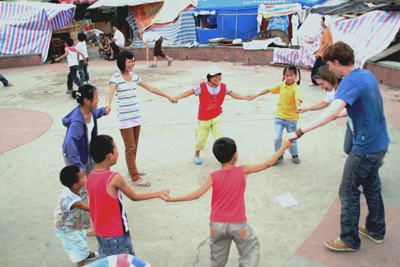
We formed a small core group of volunteers that would help ECOLOGIA staff with planning and logistics, and began spreading a general call for volunteers who would be interested in leading activities. At the height of the Rainbow Project, we had about 30 volunteers traveling in a donated school bus each week to visit children in resettlement tent camps in heavily damaged Luoshui, a bumpy two and a half hour van ride from Chengdu. (Photos shown here were taken in Luoshui in June of 2008.)
The most moving part was the personal relationships that volunteers built with children living in the resettlement camps. Many volunteers came back week after week, getting to know the children by name. We also succeeded in sticking with our philosophy: we wanted to engage children in playing and learning, not just give them donations and disappear. For instance, we would bring sporting goods, such as a soccer ball or badminton sets, play with the children for the afternoon, then collect the equipment so that it could be used again the next week (of course, this was a hard policy to follow at times, but we tried to stick with it as much as possible). The volunteers who ran the arts and crafts tables week after week brought supplies for kids to make projects each week, and while they let them take away their finished product in the end of the afternoon, they would pack up their kits for use next week. We engaged the kids in activities that needed few materials, such as big group games or dancing or learning songs. This simple strategy proved vital to helping us foster real individual relationships with the children in Luoshui, which hopefully left a more lasting impression on them than simply giving them a toy. It gave them something meaningful to look forward to each week. One parent said: "They are always smiling when you are here. They are not always like this during the rest of the week. But when you are here, they are smiling."
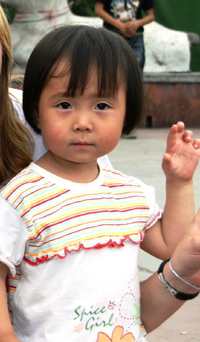 However, we did not achieve our long-term goal of partnering with a school in Luoshui. Our program in Luoshui ended as residents of the resettlement camp were moved into long-term temporary housing at the end of summer 2008.
However, we did not achieve our long-term goal of partnering with a school in Luoshui. Our program in Luoshui ended as residents of the resettlement camp were moved into long-term temporary housing at the end of summer 2008.
In September, we found East Street Primary School in Dayi County, about an hour outside of Chengdu, where students had been attending school in temporary structures after their school building was deemed unsafe after the earthquake. Whereas our activities in Luoshui had resembled a summer camp, our focus in East Street Primary School was English teaching for children in grades 1 – 5. To fit in with the school Monday-Friday schedule, the program was run on a much smaller scale than the Luoshui project, with 3-4 volunteers making the weekly trip.
Just as in Luoshui, our impact at East Street Primary School was very obvious: students lit up when we arrived. They participated eagerly in our lessons, sometimes getting a little bit too excited to focus on the content of class! Again, it was something for the kids to look forward to each week. They expressed their thanks in letters and drawings given to us on our last trip to the school in November. By the end of November, we felt that life for the children was becoming much more settled and established, and we concluded the Rainbow Project.
THANK YOU TO OUR DONORS
Support received, May – December 2008
Individual Donors – total $5,616
Anonymous [Colorado, Massachusetts, California, Rhode Island, Connecticut, New Mexico, Kentucky, Vermont, Kansas, Virginia];
Matthew Amoss, Louisiana;
Diana Bain, Vermont;
Sarah Bender, Colorado;
Richard Bennett, Utah;
Chris Bohjalian, Vermont;
Jordan Brener, Vermont;
Kate Brittain, California;
Chris Carlson and Marty Wolf, Colorado;
May Chan, Paris FRANCE;
David and Jane Chaplin, Alabama;
Zachary Chen, Illinois;
John and Julie Conroy, Maryland;
Ellie Coriell, Colorado;
Jane Detwiler, Massachusetts,
Catherine Donnell, Colorado;
Elizabeth Engelman, California;
Jennifer Finn, Colorado;
Jamie Kyra Fuchs, Connecticut;
For Kim Gormley, from Tina Holland, Massachusetts;
Sara Grantstrom, Vermont;
Michelle and Chris Hair, Colorado;
Janet Hale, Connecticut;
Ann L. Hanson, Ohio;
Joe and JoAnne Henjum, Colorado;
Nancy Henjum, Colorado;
Jamie Henn, California;
Gen A Izutsu, New Hampshire;
Gayle R Jordan, Colorado;
Beth Kemp, Colorado;
Daniel Knowlton, New Hampshire;
Deborah Knowlton, New Hampshire;
Nora Lamm, New Mexico;
Hugo Lara, Connecticut;
Liza Levy, Kentucky;
Patty and Andy Leyland;
Mike and Nancy Maday, Colorado;
Caitlin Matthews, Oregon;
Sandra McCalmon, Colorado;
Vernon and Shirley Mollan, Minnesota;
Judith A. Nolan and Elizabeth Wiernasz, Connecticut;
Maria Myra Palmero, New York;
Alexander Paraschos, Massachusetts;
Ardith Pierce, Kansas;
MacKenzie Roebuck-Walsh, Japan;
Guy Scarborough, Colorado;
Brian Siegele, Colorado;
Vu Tran, Maryland;
Lilian Vince, New York;
Christina Winker, Massachusetts;
Benjamin Young, Colorado;
Robin Young, Pennsylvania;
For Jodie Zhang from Sue Ma, Massachusetts;
Zachary Zimmerman, New Hampshire.
Organization Donors: total $ 46,722
Chengdu International Women's Club with support from the local and expatriate Chengdu community;
Church Communities Foundation, New York;
Church Communities UK, United Kingdom;
First Congregational Church and Summer Solstice Celebration of First Congregational Church in Colorado Springs;
Green Across the Pacific, Vermont;
Middlebury College 5K Fun Run (for Burma/Myanmar and China disaster relief) May 22, Vermont;
Springs Mountain Sangha Zen Buddhist Community, Colorado;
St. Paul Central High School Roots and Shoots, Minnesota;
Westwood Hills Church Social Action and Outreach Board, California.
Volunteers for ECOLOGIA's Earthquake Relief Efforts (on the ground in Chengdu):
Meg Young, Colorado;
Kate Leyland, Connecticut;
Xuefeng Liao ("Quincy"), Vermont;
Daniel Knowlton, New Hampshire;
Dr. Robbie Ali, Pennsylvania;
Huang He, Hungary,
Miko Heller, California,
Stephanie Ellis, Ohio.
|




 An anecdote from the Rabbit Queen about the impact of our work:
One woman learned how to write her name just to be able to sign for her loan from ECOLOGIA. She had never gone to school, and believed her fate was to raise her son and nothing else. Learning to write her name was a point of pride and a major accomplishment for her.
An anecdote from the Rabbit Queen about the impact of our work:
One woman learned how to write her name just to be able to sign for her loan from ECOLOGIA. She had never gone to school, and believed her fate was to raise her son and nothing else. Learning to write her name was a point of pride and a major accomplishment for her. 
 However, we did not achieve our long-term goal of partnering with a school in Luoshui. Our program in Luoshui ended as residents of the resettlement camp were moved into long-term temporary housing at the end of summer 2008.
However, we did not achieve our long-term goal of partnering with a school in Luoshui. Our program in Luoshui ended as residents of the resettlement camp were moved into long-term temporary housing at the end of summer 2008.